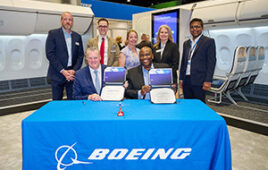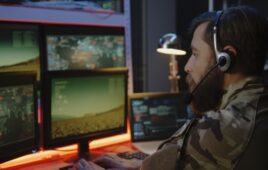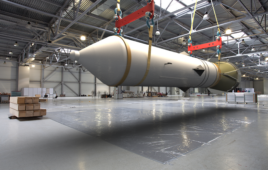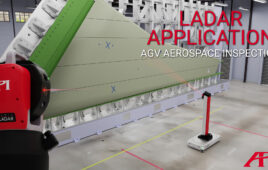Members of the Cognitive Science Team at the Natick Soldier Research, Development and Engineering Center, or NSRDEC, are helping Soldiers to keep it real — and then some. The team is investigating how augmented reality, or AR, may help Soldiers improve their mission-planning skills.
“Our goal is to evaluate mobile AR as a promising candidate technology to improve mission-planning operations,” said Aaron Gardony, an NSRDEC research psychologist. “Soldiers are members of a team, but they are also multi-faceted individuals with unique preferences and aptitudes. For example, some may easily visualize three-dimensional environments from two-dimensional maps, but others may learn better using 3-D imagery.
“In contrast to the one-size-fits-all approach 2-D representations provide, we believe AR-based mission planning using interactive 3-D maps and models could allow individuals to tailor their planning experience to their own preferences and those of their team members. Doing so could improve cognitive performance at both the individual and group level, leading to improved mission-planning outcomes and, ultimately, enhanced mission effectiveness.”
Currently, mission and route planning is often performed by Soldiers located in the same place using 2-D displays, such as topographic maps, but improvements in technology have enabled new approaches.
“Recent advances in augmented reality technology have allowed for rich, mobile and multi-user augmented reality experiences,” said Gardony. “Leveraging this nascent technology in our current work, we ask how AR-based interactions with rich 3-D environmental models can improve route learning compared to existing 2-D methods.”
In the ongoing study, participants learn a prescribed route while interacting with a 3-D model of a city. They are able to zoom, pan and rotate their view while memorizing the route, and then they are tasked with walking the route from memory.
Through the research, NSRDEC scientists hope to observe and quantify the physical interactions and strategies Soldiers use during the AR-based city exercise. The study also aims to find out how individual knowledge, skills and abilities may predict the individual’s interactions and strategies, as well as their ability to learn and navigate complex routes.
The study is being performed at the Center for Applied Brain and Cognitive Sciences, or the Center for ABCS. NSRDEC teamed up with Tufts University School of Engineering to create the center, which brings together experts in neuroscience, psychology, linguistics, computer science and robotics. Through the center, NSRDEC and Tufts University are collaborating to advance researchers’ understanding of how people think, respond and perform in demanding, real-world situations. The center aims to provide insight into how Soldiers think in response to ever more complicated and challenging environments.
“The Center for Applied Brain and Cognitive Sciences seeds rapid multidisciplinary scientific and technological innovation,” said Gardony. “The center’s access to cutting-edge technologies, such as the Microsoft HoloLens and team-level immersive virtual reality, allows NSRDEC scientists to take an integrative and comprehensive approach to Soldier-relevant applied cognitive research. Housed near Tufts’ Medford campus, the center’s location affords us ready access to expert Tufts faculty from diverse disciplines, technical support staff, as well as Boston-area cognitive science researchers, fostering collaboration and interdisciplinary research efforts. This unique combination of innovative technological capabilities, brilliant colleagues, and its location makes CABCS an excellent place to efficiently and effectively pioneer next-generation Soldier-relevant research and technology.”
The augmented reality research could lead to the discovery of ways to optimize Soldier performance.
“Virtual and augmented reality technologies provide realistic simulations of real-world scenarios that have the potential to improve mission performance, operational flexibility and training effectiveness while reducing risk,” said Gardony.
“Augmented reality provides Soldiers and small teams unprecedented access to high fidelity visualizations, affording rapid, interactive enhancements to situation awareness, planning and decision making,” said Dr. Tad Brunyé, a senior research psychologist on NSRDEC’s Cognitive Science Team and scientific manager of Perception, Cognition and Action at the CABCS. “This project demonstrates how the defense science community benefits from leveraging cutting-edge commercial tools to advance the art of the possible in Soldier and small unit performance optimization.”
“This study takes a novel step in evaluating AR for mission planning/route learning,” said Gardony. “Positive results could provide a basis for future fielding of these technologies to improve mission planning and justify future research examining its impacts in other military contexts.”
The networking possibilities made possible through emerging mobile AR platforms could enable multiple users to have collaborative shared experiences, thus enabling Soldiers to do their jobs better.
“Soldiers could use mobile AR to engage in flexible, on-the-fly mission planning with remote team members,” said Gardony. “For example, in rapidly evolving combat and non-combat scenarios, leaders could remotely deploy and brief updated mission objectives to Soldiers in the field, engaging in remote collaboration and mission planning using timely 3-D models of exterior and interior spaces.”
Gardony is dedicated to advancing cognitive science, especially when it helps the Soldier.
“Our research does not happen without an in-depth understanding of the contexts and constraints imposed upon Soldiers, and how technological and scientific innovation can improve monitoring, characterizing, predicting and optimizing human cognition and behavior,” said Gardony. “It is highly rewarding to be part of something bigger, to know that the results of our research could improve Soldier effectiveness and well-being. It is also rewarding to interact with Soldiers regularly as part of our research, both as participants in our studies and as providers of key feedback about their experiences and challenges, grounding our scientific outcomes and motivating future research questions.
“Many Soldiers and leaders are excited to participate in and benefit from our research, and see the value in what we do. That motivates us to work even harder for them.”
Filed Under: Aerospace + defense, Virtual reality




